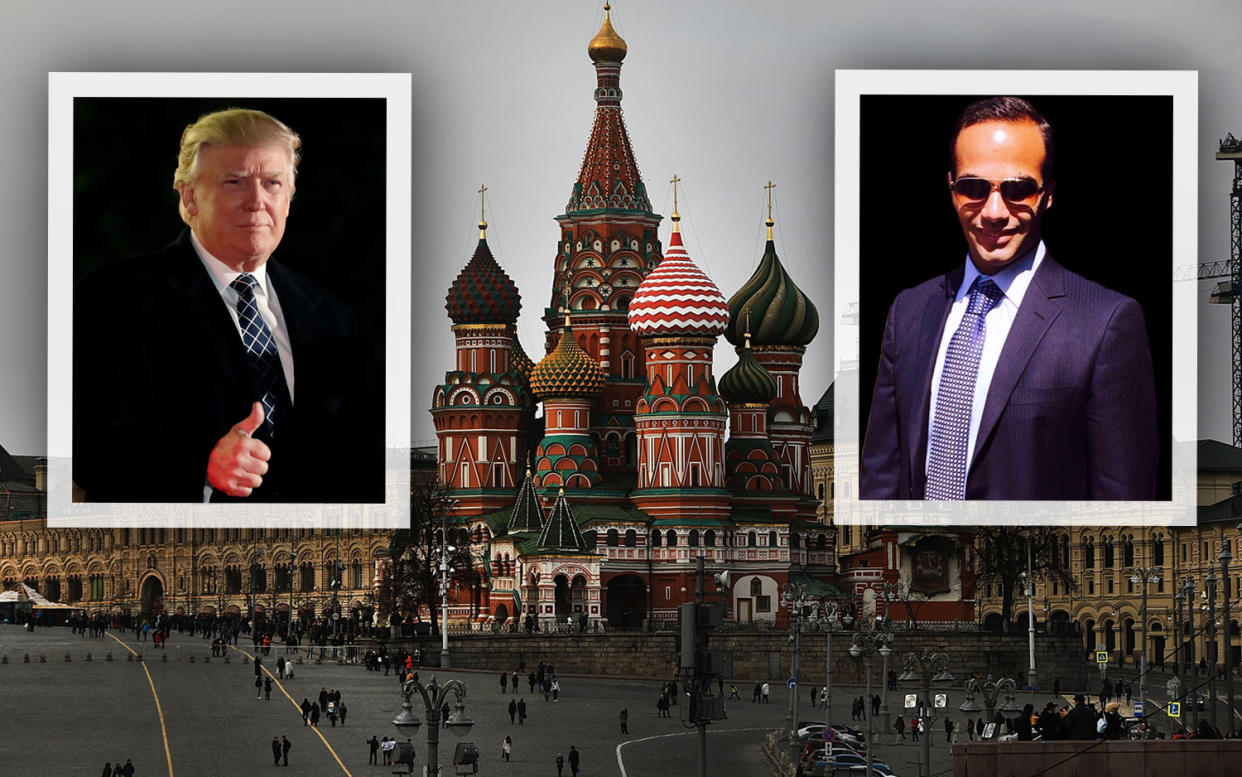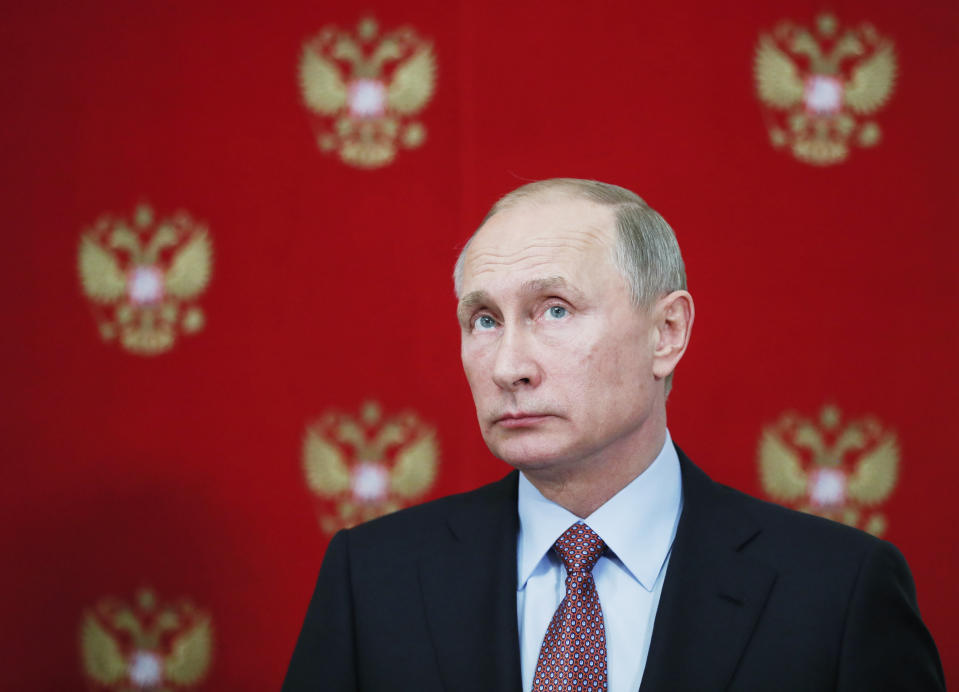Trump 'will restore trust' with Kremlin, Papadopoulos told Russian news agency

WASHINGTON — Shortly after he had conversations with people close to the Kremlin that got him in hot water with the FBI, George Papadopoulos was using his position as a campaign adviser to President Trump to argue that the United States should cooperate with Russian President Vladimir Putin. Papadopoulos’s exact role in the campaign is disputed, in part by Trump himself, but during his tenure as an adviser, he advocated in interviews for positions in line with Moscow’s interests.
“Russia does not believe in American promises, and the atmosphere of mutual confidence has been lost. Trump, if elected president, will restore the trust,” Papadopoulos said in a September 2016 interview with the Russian news agency Interfax.
Court documents unsealed by special counsel Robert Mueller on Monday revealed Papadopoulos pleaded guilty to making false statements to the FBI about contacts he had with people tied to the Russian government during his time on Trump’s campaign.
Papadopoulos’s conversations with the Kremlin associates began shortly after he joined Trump’s team as a foreign policy adviser in March 2016. They included discussions about arranging a potential meeting between Putin and Trump, and a conversation Papadopoulos had with a professor who claimed to be close to Russian officials. According to the court filings, the professor told Papadopoulos Russia had “dirt” on Trump’s election opponent, Hillary Clinton, in the form of “thousands” of her emails. The hack, which U.S. intelligence agencies have linked to the Kremlin, is a major focus of Mueller’s probe into Russia’s efforts to interfere in last year’s U.S. presidential race.
On Tuesday morning, Trump referenced Papadopoulos’s guilty plea in a series of tweets. Trump dismissed Papadopoulos as a “young, low level volunteer” who “few people knew” and who was “proven to be a liar.”
The exact role Papadopoulos played on Trump’s campaign remains unclear. On March 21, Trump told the Washington Post that Papadopoulos was one of five members of his foreign policy team. Trump described Papadopoulos as an “excellent guy.” That raised eyebrows because of the relative inexperience of Papadopoulos, a 2009 college graduate who listed participation in “model U.N.” on his résumé.
Nevertheless, Papadopoulos was apparently empowered to speak publicly on behalf of the campaign. On April 7, 2016, the Jerusalem Post newspaper published what it described as a summary of comments Papadopoulos made during a visit to Israel that week when he had lunch with “with research associates of the Begin-Sadat Center for Strategic Studies.” According to the Jerusalem Post, Papadopoulos “expounded on what he says is Trump’s prism on global affairs.” The paper quoted Papadopoulos as vowing Trump would “‘overtly seek’ serious engagement with Russia on a range of common concerns,” in contrast to President Barack Obama, who focused on “isolating and sanctioning Russia.”
“Trump, says Papadopoulos, sees Russian President Vladimir Putin as a responsible actor and potential partner,” the newspaper reported.

The Jerusalem Post also quoted Papadopoulos as claiming Russia had been “careful not to cross NATO lines.” That comment belies increasing tensions between Moscow and the NATO alliance, which was established to counter Soviet expansion during the Cold War, and more recently has been confronting a more assertive Russia. Papadopoulos was described by the newspaper as proposing areas of potential cooperation between Russia and the U.S., including “combating the export of radical and violent Islam from the Middle East.” That comment from Papadopoulos echoes Putin’s positions. Papadopoulos also told the paper the two countries could work together “to counter Chinese expansionism in Asia and the Middle East.”
Papadopoulos gave a more in-depth interview to Interfax on Sept. 30, 2016. By that time, Papadopoulos had been told about the “dirt” on Clinton and had told his superiors on the Trump campaign that he was willing to make an “off the record” trip to Moscow to capitalize on his connections with the Russian government. Though a more senior member of the team — identified by Yahoo News as former campaign co-chairman Sam Clovis — told Papadopoulos to make the trip if it was “feasible,” he did not, in the end, go to Moscow.
In his interview with Interfax, Papadopoulos said Trump wanted to “usher in a new chapter in U.S.-Russia ties.” Papadopoulos argued that “it is in the interest of the U.S., NATO and Russia to deescalate hostilities immediately and work together towards combating common threats,” including terrorism. He also criticized sanctions that Obama imposed on Moscow following its annexation of Ukrainian territory in 2014, which was a major source of tension between Russia and NATO.
“Sanctions have done little more than to turn Russia towards China as a primary market for Russian goods, services and energy. It is not in the interest of the West to align China and Russia in a geopolitical alliance,” Papadopoulos said.
Removing those sanctions is a priority for Putin’s government.
Speaking to Interfax, Papadopoulos also argued against removing Syrian President Bashar Assad from power. Assad is a Putin ally, and American opposition to him has been another sore spot for the U.S. and Russia.
“We do not support aggressive changes of regimes anywhere, including Syria,” said Papadopoulos.
Interfax pressed Papadopoulos about whether he supported a potential expansion of NATO. Russia has repeatedly described potential NATO expansion as a threat. Papadopoulos dodged the question without expressing support for or opposition to NATO’s growth. Instead, he argued the current tensions are extremely dangerous, and called for greater cooperation between the U.S. and Russia.
“If mutual confidence between our countries exists, then we will better understand the expectations of each other, and we can more accurately define the ‘red lines’ which cannot be crossed,” Papadopoulos said. “However, what is happening today between Russia and NATO, and between Russia and the West in general, creates an extremely dangerous and unstable situation in which every incident could become fatal.”
Read more from Yahoo News:


